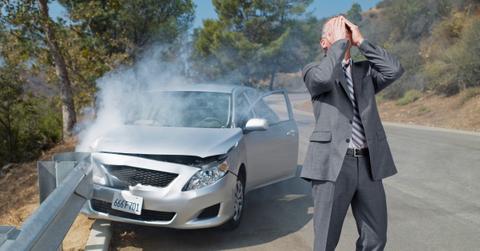What Happens When an Insurance Company Writes a Car Off?
If the insurance company writes your car off, it means the vehicle is considered a total loss.
Dec. 13 2021, Published 10:23 a.m. ET

When a vehicle is written off by the insurance company, it means the car is totaled. A totaled vehicle is one that sustains such severe damage in which the cost to repair it would exceed the vehicle’s actual cash value.
For instance, let’s say your vehicle is worth $5,000 and the damage it sustained in an accident is estimated to be about $8,000. Rather than paying more than what your vehicle is valued at to make the necessary repairs, the insurance company will instead, deem it a total loss and write it off.
What does the insurance company do when a vehicle is totaled?

If you’re involved in an accident and your insurance company writes your vehicle off, it means the carrier has estimated the cost of repairs, and the amount is more than what your vehicle is actually worth. Allstate, one of the largest auto insurance providers in the U.S., says some states have total-loss thresholds that dictate when a vehicle is considered totaled.
In Florida, the total-loss threshold is set at 80 percent, meaning “a car is considered a total loss when the cost of repairs plus the salvage value is at least 80 percent of the vehicle’s actual cash value.” When an insurance company writes off a vehicle, it generally pays its policyholder the actual cash value of the car, which is equivalent to what the vehicle was valued at prior to the accident.
How much will an insurance company pay for a totaled vehicle?
To collect a check from your insurance company for your totaled vehicle, you’ll need to have either comprehensive or collision coverage. Comprehensive coverage will pay if your vehicle becomes damaged from something other than a motor vehicle wreck. Collision coverage will reimburse you if your vehicle becomes totaled in a car accident you were at fault for.
If you have adequate insurance coverage and your insurer writes off your vehicle, the carrier should provide you with a check for your vehicle’s actual cash value. A vehicle’s actual cash is determined using the vehicle’s “age, condition, mileage, and resale value.” The insurer might also take into account how much your vehicle is selling for locally when determining its actual cash value.
If you have a deductible, the insurance company will likely deduct this amount from your vehicle’s actual cash value. In the event you were involved in an accident that wasn’t your fault, the other driver’s liability insurance may be required to reimburse you if the insurance company deems your vehicle a write-off. Liability insurance is required in all states, with the exception of New Hampshire.
Do insurance companies keep totaled vehicles?
In most cases, it's standard practice for the insurance company to keep a totaled vehicle. You may be given the option to keep it, but your insurer will likely deduct its salvage value from its actual cash value, according to NOLO.
What happens when a leased or financed vehicle is totaled in an accident?
When the insurance company writes off a vehicle that's being leased or financed and the actual cash value is less than what's owed on the car, you’re still liable for paying your lender any remaining balance. Therefore, if your totaled vehicle’s actual cash value is $15,000 but you still owe $20,000 on your car, you would be obligated to pay your lender $5,000.
